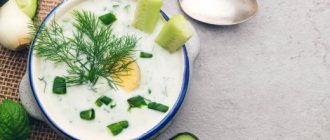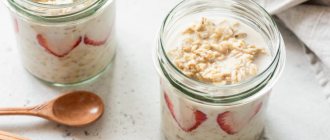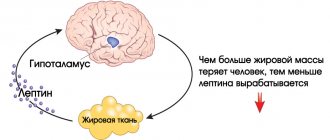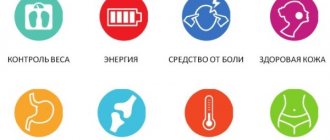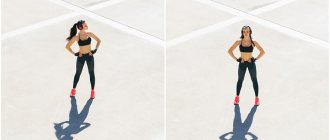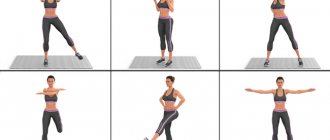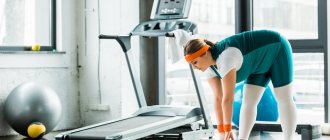August 27, 2010
Alexey Korochkin, a researcher at the Department of Exercise Therapy and Sports Medicine at the Russian State Medical University, tells how to eat properly for a person training to lose weight.
Many people start fitness classes in order to get rid of extra pounds. And, if in the gym the trainer monitors how the classes are going, then you have to control the diet yourself. Alexey Korochkin, a researcher at the Department of Exercise Therapy and Sports Medicine of the Russian State Medical University, talks about how to eat properly for a person who is training to lose weight and not gain muscle mass.
Glycemic index
Simple carbohydrates, they are fast. Complex carbohydrates, they are slow. What does this mean and what should you eat? Read our detailed explanations.
Why is it important to eat before exercise?
Carbohydrates are the fuel that allows us to perform at our full potential. There is a common misconception that you can show up to class on an empty stomach and perform just as effectively thanks to the glycogen stores in your muscles and liver (our reserve reserve of carbohydrates for exercise and in case of hunger).
But there are two traps here: firstly, glycogen reserves are limited, and for an ordinary person they will last about 90 minutes, and then an inevitable decline in productivity and a feeling of weakness in the body will follow. Secondly, the depletion of one’s own reserves of polysaccharides will require a long time to restore them.
That is why eating before training is a guarantee of its successful completion and adequate recovery of the body after completion of training, and it does not matter when you train - in the morning, at lunch or in the evening.
Calculation of calorie intake
Once in the body, nutrients act as “fuel”: they give vitality, activity, and the ability to perform complex exercises. Their volume is determined by calories. The optimal number of calories ensures a harmonious physique, excellent health and proportional muscle development.
Correct diet. What can you eat before training?
Excess energy is stored in the “storage areas” of fat layers. Deficiency causes anemia, loss of muscle mass and apathy.
Harris-Benedict calculation formula
- BMR (the minimum amount of energy that the body requires for normal functioning) for men = 88.362 + (13.397 times weight in kg) + (4.799 times height in cm) – (5.677 times age in g).
- BMR for the fairer sex = 447.593 + (9.247 times weight in kg) + (4.330 times age in years).
How long before training can you eat?
The timing of meals directly affects the metabolic processes in the body, since the consumption of carbohydrates first leads to an increase in blood glucose levels, and then insulin as a response. Why is it important?
Eating 1-4 hours before exercise will bring your glucose and insulin levels back to pre-meal levels by the start of your workout, while eating less than an hour before exercise will spike your blood sugar right before. first approach on the simulator.
The key problem is that insulin, produced in the pancreas in response to meals containing carbohydrates, leads to a temporary drop in blood sugar levels. And if you ate something sweet right before training, you will first feel a surge of strength (blood glucose will jump), and then a slight weakness (insulin will increase the absorption of glucose by cells and the intensity of glycogen synthesis, which will lead to a drop in blood sugar levels).
The body needs about 20 minutes to return the sugar level to its original value. It is for this reason that there are two basic recommendations:
- eating in advance - optimally 2-3 hours before training;
- consumption of complex carbohydrates with a low glycemic index.
Sports nutrition: supplements and cocktails, rules for their use
Sports nutrition ensures quick saturation of the body with essential nutrients.
It is important not to substitute concepts and not to use sports nutrition as a replacement for a full meal, but only to supplement the diet.
Rules for using sports nutrition:
- Gainer and protein . If you don’t have time to eat, you can take 30 g of whey protein or the same amount of gainer 2 hours before the start of your workout.
- Amino acids . To build muscle, take 15 g of the BCAA amino acid immediately before starting training. Scientists recommend taking amino acids only when following a low-calorie diet.
- Fat burning complexes. If you intend to lose weight, fat burners are used 30 minutes before classes. MuscleTech - HYDROXYCUT Hardcore X (210 capsules per pack) and Universal Nutrition - Animal Cuts (sold in 42 packs) The complexes accelerate metabolism, warm up muscles and burn fat.
- L-carnitine is the most popular fat burning supplement. It helps in transporting fat cells to their disposal sites - the mitochondria of muscle fibers.
What can you eat before training?
Nutrition during sports should take into account the balance of proteins, fats and carbohydrates. The proportions may vary slightly depending on gender, age, current physical shape and body characteristics, but in general it is recommended to follow the values:
- proteins – 30-35%;
- fats – 10-20%;
- carbohydrates – 50-60%.
Before a workout, especially a long one, focus on complex carbohydrates, which will become your source of energy:
- Brown rice;
- oatmeal;
- durum wheat pasta;
- sweet potato;
- whole wheat bread.
What to eat before training if you are losing weight
The main principle of losing weight is to burn more calories than you consume.
Therefore, before exercise, it is best to eat:
- light carbohydrate foods, such as porridge;
- vegetable or fruit salads;
- breads.
If you don’t have time to eat properly in advance, you shouldn’t go to training on an empty stomach. Drink a glass of kefir or eat an apple 30 minutes before starting classes.
If you are gaining muscle mass
To build muscle mass, you need to create a calorie surplus and consume a sufficient amount of protein: from 1.6 to 2.2 grams per kg of body weight per day.
The diet must be rich in carbohydrates so that the body is able to perform volumetric strength training with heavy weights.
An example of a daily diet for an athlete working on weight:
- Breakfast – rice with steamed vegetables, bread, protein shake.
- Snack – protein bar.
- Lunch – baked potatoes, beef stew, vegetable salad.
- Before training - a protein shake, an energy bar.
- Dinner – stewed meat or fish, buckwheat or rice.
If you want to get more energy
The issue of energy and performance during training is especially acute for athletes involved in endurance sports - swimming, running, cycling, skiing.
General recommendations for nutrient balance are as follows:
- Low-intensity workouts lasting less than 90 minutes can be done on an empty stomach.
- High-intensity less than 90 minutes - before training you need to eat 75 g of carbohydrates and 10-30 g of protein.
- Low intensity over 90 minutes – 75g carbohydrates and 10-30g protein.
- High intensity over 90 minutes – 75-150g carbohydrates and 10-30g protein.
Special pre-workout complexes and caffeine can be an additional source of energy:
- Caffeine has been shown to be effective in enhancing athletic performance in trained athletes when consumed in low to moderate dosages (about 3-6 mg per kg body weight) and does not further enhance performance when consumed in higher doses (greater than 9 mg per kg body weight). ).
- Caffeine may increase alertness during long periods of strenuous exercise or when you are sleep deprived.
- Caffeine supplements are beneficial for high-intensity exercise, including team sports.
And if you are drying
Cutting is a period of reducing the percentage of body fat in training athletes. This is a particularly stressful time for the body, since the diet often minimizes the content of carbohydrates and fats. The emphasis is on protein foods, since during the drying process it is necessary to maintain the gained muscle mass.
Products that are best suited for these purposes:
- sea fish;
- chicken breast;
- skim cheese;
- cauliflower or broccoli;
- omelette;
- boiled eggs.
However, you should not completely exclude carbohydrates from your diet, especially before training, because your performance depends on it.
Extra pounds from diets
Often people try to combine exercise in the gym with a variety of diets. Mainly those that greatly limit the caloric content of the diet - they are very popular today. However, modern sports nutrition specialists do not approve of such “traditions” at all. When a person sharply reduces calorie intake and begins to eat less than he needs to cover daily energy costs, his weight naturally decreases. But once the desired result is achieved, the kilograms quickly return. However, you should not fast during the day
.
Korochkin explains: human metabolism is designed in such a way that food intake should occur several times a day. If you are in a state of hunger for 8-10 hours while you are awake, the body adjusts its work to store an additional supply of nutrients. It turns out that everything eaten is not used to provide energy for the body, but is used as a reserve. After all, the body does not know when the next time it will receive the next portion of food. The best choice
for those who are going to lose weight by playing sports is split meals. If you eat 5-6 times a day, the body does not have time to get hungry. Therefore, he spends calories in the required amount without storing them in reserve.
What foods are contraindicated before exercise?
Fast food
Before training, we need food high in carbohydrates and proteins. But hamburgers and fries don't really fit in here.
Firstly, fast food contains a lot of saturated fats, which will take the body at least 4 hours to digest.
Secondly, McDonald's food contains a lot of sodium, an excess of which upsets the balance of fluids in the body. And this can affect performance during training.
Thirdly, carbohydrates in fast food are mostly fast and have a high glycemic index. This means your blood sugar levels will rise quickly and you won't get the energy you need during exercise.
Milk products
Milk contains protein, carbohydrates and fats and takes a long time to digest. This is why dairy products are mainly used as a means of post-workout recovery.
Sweet drinks
Most lemonades contain many artificial sweeteners, which increase blood sugar levels and do not provide the necessary energy supply for training.
Alcohol
Alcohol dehydrates, disrupts balance, and distorts decision-making processes. Drinking a bottle of beer before training is not the best solution.
Spicy food
Spicy foods, especially in large quantities, can cause heartburn and muscle cramps.
Is coffee and tea good for an athlete?
Coffee contains caffeine, which can disinhibit the nervous system and stimulate the production of adrenaline for vigor and athletic aggression. Caffeine has a short-term effect on the human body. Green tea enriches the body with vitamins A and C, which are required for muscle growth.
Antioxidants in the composition promote fat burning. These drinks will not bring health to the athlete, especially if consumed on an empty stomach, diluting saliva and reducing the speed of digestion. It is better to drink black tea with the addition of milk, alternating with freshly brewed green tea. Coffee is allowed no later than 1 hour before sports.
Top 5 Pre-Workout Products
Oatmeal
A good source of energy that is quickly absorbed by the body.
Brown rice and chicken breast
Brown rice is one of the best sources of slow-release carbohydrates, and chicken is an ideal form of lean protein.
Protein shake
A protein shake can be a good option for those who don't get enough protein from food or don't have the opportunity to eat a normal meal before a workout.
Peanut butter sandwich
Whole grain bread is an excellent source of complex carbohydrates, and peanut butter is high in protein, vitamin E and magnesium.
Energy bar with granola
An energy bar contains carbohydrates with different glycemic indices, which will be gradually absorbed by the body and provide you with energy in portions.
More about training, nutrition, sports medicine and sports as an activity - in the “Health” section
Subscribe to the Sports.ru telegram channel about health
Photo: pexels.com/Trang Doan, Foodie Factor, Li Sun, Ella Olsson, Maor Attias, Burst, Robin Stickel, alleksana, Trista Chen, Suzy Hazelwood
We remind you that we have a discount section where you can find Grow Food promo codes.
How to do oral hygiene
The main task is to preserve the blood clot on the wound of the extracted tooth, while maintaining cleanliness and health in the mouth. How to properly care for your teeth during this period:
- There is no need to carry out any hygiene procedures immediately after tooth extraction. It is better to postpone the first brushing of your teeth until the next morning. You will need a brush with soft bristles. And it’s better to take a new one so that it is sterile. You need to brush your teeth with a small amount of paste, avoiding the wound area, and clean adjacent teeth with caution.
- Do not rinse your mouth (including after brushing your teeth) or use an irrigator in the first three days! The clot may dissolve or be washed away with the flow of fluid, and treatment will have to be restarted. Instead of rinsing, make mouth baths - just take water into your mouth and carefully spit it out. If the doctor prescribes antiseptic drugs, rinse with them,
- try not to touch the open wound with your tongue, hands or toothpick - this can damage or dislodge the clot and introduce an infection into the hole.
You can’t neglect hygiene - bacterial plaque will accumulate in your mouth, which can cause inflammation.
Read also
- Why is carbohydrate loading necessary, and how to do it correctly? We analyze recommendations and common mistakes
- Nutrition for gaining muscle mass for men at home
- How to eat properly during training?
- What and when can you eat after training?
- Nutrition for athletes - what can and cannot be eaten by an athlete?
- How will tea help before and after training? Is green healthier than black?
